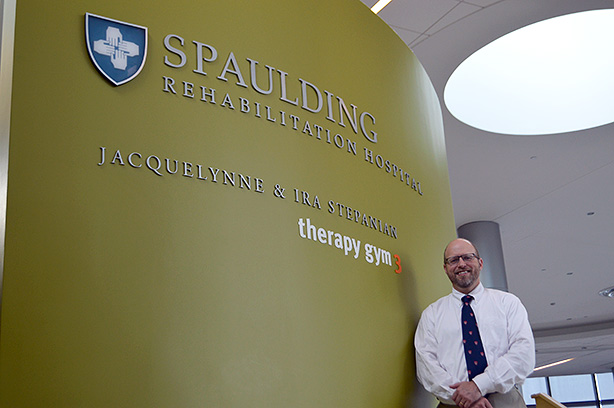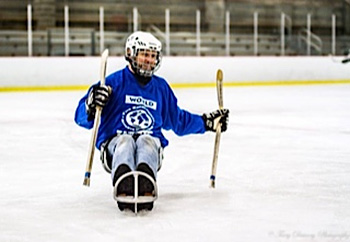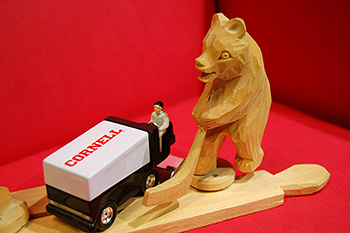
Dr. David Crandell '84 is director of the amputee program at Spaulding Rehabilitation Hospital in Charlestown, Massachussetts. Photo: Provided.
Amputee program director gets patients moving toward recovery
On the day of the Boston Marathon in April of this year, Dr. David Crandell '84 was making his usual rounds while attempting, between patients, to catch snippets of the race on the hospital's TV screens. An avid fan of the marathon who has run and volunteered for the race, Crandell supported the event this year through donations and by performing his duties as director of the amputee program at Spaulding Rehabilitation Hospital in Charlestown, Massachussetts.
Two years ago, Crandell and his team faced the challenge of treating the 33 most severely injured victims of the marathon bombing; 16 required amputations. Crandell says that their recovery will be long, but he is inspired by their steady progress.

Crandell, pictured here on a hockey sled, is an avid Cornell hockey fan and is trying to build Spaulding Hospital's sled hockey team, and purchased two dozen sleds this year through a donation from one of his patients. Photo: Terry Downing.
"Most are doing well," Crandell says. "One of the patients went skiing for the first time recently … and some of them want to get back into running and a couple of them even ran part of the race this year, which is very exciting."
Crandell praises the resilience of the marathon victims and of his patients, while emphasizing the need for continued public awareness and support for amputees: "This is a patient population with unique challenges that we as a community need to understand, and we need to figure out services that they need regardless of how their injuries happened."
"We don't look at amputation as a failure," Crandell says of his interdisciplinary team of physicians and therapists at Spaulding. "We look at it as just a different stage … and we are using any opportunity to create a culture of expanding opportunities."
New technology is vital to this effort, and Crandell is collaborating with Boston-area scientists and researchers including those at the Massachusetts Institute of Technology's Media Lab to develop bionic prostheses that his patients are testing.
Crandell says he sometimes thinks of himself as a "clinical bioengineer," and he recalls his lifelong interest in the fusion of medicine and technology -- from his teen years as a "Star Wars" fan in Long Island, New York, to his formative years at Cornell, where he majored in neurobiology and behavior at the College of Agriculture and Life Sciences, and his medical school training at the University of Buffalo in the 1980s when rehabilitation as a medical field was "still new and growing."
Crandell also is an athlete, and has run the marathon twice. The first time was 20 years ago and the second time was last year, when he served as one of the sighted guides for New Jersey runner Jennifer Herring.

A miniature Cornell-branded Zamboni and a familar bear are among the items on Crandell's desk.
What drives Crandell is his belief in the healing and energizing power of physical movement. This idea animates his volunteer efforts as the team physician for the USA National Amputee Hockey Team and as vice president of USA Hockey Warriors Ice Hockey Program for military veterans with disabilities. At Spaulding, he also is medical director of the adaptive sports program, which offers year-round activities.
Currently Crandell, an avid Cornell hockey fan, is trying to build Spaulding's sled hockey team, and purchased two dozen sleds this year through a donation from one of his patients.
Crandell says several of his patients are finding themselves more engaged in sports and physical activity than they were before their injuries or loss of limb -- and the effect has proven to be empowering.
"Once people go out and they try these sports, they realize that they can do other things," he says. "Getting people out and trying new things changes their whole perspective on what it is to have a disability. They gain a different ability."
Links:
Six Heroic Saves: Doctors and Patients of the Boston Marathon Bombings (from Boston magazine)